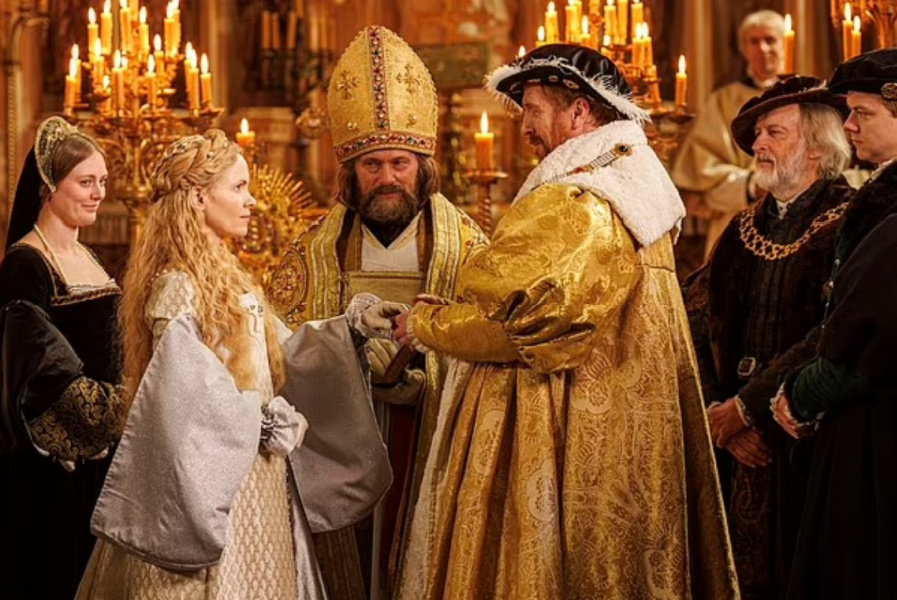– No Friend is Safe –
Five out of Five Stars
by Christopher Stevens | Daily Mail | November 4, 2024
For all his jewels, his furs and finery, his procession of wives and legions of flatterers, the all-powerful Henry VIII lacked one essential item – a selfie stick.
As the splendid Tudor drama Wolf Hall returns to BBC1 on Sunday, Damian Lewis is playing the tyrannical monarch as a narcissist.
He can’t stand up without striking a pose – one fist on his hip, the other hand fondling the pommel of his sword, just as he does in his portrait by court painter Hans Holbein.
His Maniacal Majesty would have loved selfies. He’d have photographed himself ceaselessly, glowering up at the camera or manspreading to show off his codpiece to its best advantage.
The brilliance of Wolf Hall is that it depicts the king and his courtiers from 500 years ago both as historical figures and as human beings whose vanity, greed and duplicity would not be out of place in our own time.
We almost forget we’re watching the events of centuries long past, for their motives seem so modern.
From that perspective, the story of Good King Hal traces the rise of a dictator – a man who, in the words of his closest advisor Thomas Cromwell: ‘Refuses to be cheated out of any part of his will. He’ll give half his kingdom rather than be baulked.’
Henry values loyalty above everything but can be loyal to no one, let alone the people closest to him. No friend is safe, and everyone is only one slip away from the axe.
The obvious parallel is with Vladimir Putin, who will kill anyone that dares thwart him. The only difference is that the Tudor despot chopped off his enemies’ heads, while the Monster of Moscow has them pushed out of windows.
Despite being all-powerful, Henry is almost a peripheral force, a growling volcano on the edge of the narrative, constantly threatening to erupt.
It is Cromwell at the centre of every scene, and Mark Rylance plays him with a hesitant diffidence in sharp contrast to his master’s ominous voice.
Cromwell constantly fidgets with his fur cap – doffing it as a gesture of humility, turning it around nervously in his hands, straightening it fussily when he needs time to consider his next gambit.
This self-effacement makes his sudden snarls and strikes all the more effective. Cromwell likes to compare himself to a butcher’s dog, good at standing guard. But Rylance makes him more of a cur, skulking with his teeth bared.
When a scheming Catholic nobleman proposes a meeting at his home, Cromwell almost wags his tail: ‘Well, that would honour me, Sir Geoffrey.’
But a moment later he bites: ‘Come to me – I’m busy!’ And when an old friend of the king’s mistakenly offers unwanted advice, Cromwell seizes him by the throat and shakes him like a stick.
It’s a powerful performance from an actor who lacks the physical presence of the real Thomas Cromwell, a man who (as his own Holbein portrait reveals) had the squat physique of a toad on steroids.
The first episode opens as the previous series ended, with the execution of Anne Boleyn. However many times we’ve seen it, in innumerable retellings, it’s a moment that never fails to shock.
Claire Foy, as the bewildered, trembling queen who can’t quite believe her fate, is especially touching, now that we associate her so closely with that other English queen – the young Elizabeth II in The Crown. Before that, though, director Peter Kosminsky plays an arch joke.
When it debuted in 2015, Wolf Hall was heaped in plaudits, with just one criticism: the cinematography was too dark. Whole scenes were shot by the light of a single candle, which might have been historically accurate – but left viewers complaining of eyestrain.
This time, it appears at first Kosminsky is determined to make the same stubborn mistake. The opening shot of Anne in a boat, being brought through Traitor’s Gate to the execution ground at the Tower of London, is so gloomy that the actors are barely visible through the shadows.
But moments later we emerge from the tunnel, every scene now well-lit – even when Cromwell is working alone at his desk by a guttering flame, conversing with the ghost of his former boss Cardinal Thomas Wolsey (Jonathan Pryce).
Anyone who doesn’t remember the first series or know their 16th century timelines might be confused by this spirit in red robes, who vanishes when other characters enter the chamber.
The device is theatrical but effective, conveying how Cromwell is haunted by his past, able to trust no one but the dead.
It also captures a central hallucinatory element of Dame Hilary Mantel’s final novel, The Mirror And The Light, on which these six episodes (all available from Sunday on BBC iPlayer) are based.
The book, the last of the Wolf Hall trilogy, was written during her long illness before her death in 2022, and it is the weakest of the three. One passage, a feverish dream, meanders on for dozens of pages.
Brilliant though the first two were, the third was an overlong disappointment that failed to grip. This adaptation appears to have overcome those weaknesses and delivered a conclusion that is worthy of Mantel’s vision.
Read the rest of the original article at Daily Mail
